International Journal of Cognitive Research in Science, Engineering and Education @ijcrsee
Статьи журнала - International Journal of Cognitive Research in Science, Engineering and Education
Все статьи: 494
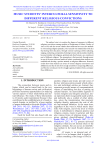
Music students 'intercultural sensitivity to different religious convictions
Статья научная
The authors’ aim is to analyze the degree of openness to different religious convictions among students of Department of Music, Faculty of Arts in Niš, and also to test whether these students have an active attitude on overcoming religious prejudice. The research was initiated due to the fact that during their education, through various teaching activities (playing, singing, conducting, composition, listening to music and its analysis) students become familiar with religious, spiritual, and church music, as a constituent part of different religions. The assumption is that precisely through music as one of the most universal media of artistic communication students can establish and develop a positive attitude to religious differences. Research results show that students are aware of various religious convictions and affiliations, but they do not show enough sensitivity to respecting differences, and they do not take part in the struggle against prejudices that accompany those differences.
Бесплатно
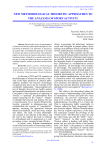
New methodological theoretic approaches to the analysis of sport activity
Статья научная
Based on the views of representatives of domestic and Western philosophical thought (M. Merleau-Ponty, P. Bourdieu, N.A. Bernstein, E. Knyazeva), the author offers a nontraditional approach to the study of essence and nature of sports activity. The productive analysis of sports activity requires such technics of intellectual procedures, which allow to consider sports activity not only as a physical sphere but also as a mental one, including cognitive, mental, psychomotor and emotional aspects.
Бесплатно
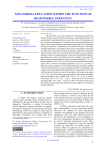
Non-formal education within the function of responsible parenting
Статья научная
The aim of this survey was to discover to what degree parental non-formal education is present within the function of responsible parenting. The questionnaire research method was used in the survey. For the purpose of this research a questionnaire of 13 questions was constructed relating to the forms of non-formal education, and another questionnaire of 10 questions relating to the parents’ expectations of non-formal education. The sample included 198 parents. Examination of the scores concerning the presence of certain forms of parental non-formal education realized in cooperation with the school leads to the conclusion that the parents possess a positive attitude towards non-formal education. The analysis showed that the parents’ expectations were not on a satisfactory level. According to the results, the fathers displayed a greater interest towards non-formal education (7.72±1.35) than the mothers (6.93±1.85), (p
Бесплатно
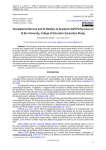
Статья научная
This study aims to identify the occupational burnout and its relation to teaching performance among Al Ain University (AAU) academic staff. The sample of the study consisted of 60 male and female teachers of Al Ain University First Directorate of Education. The researchers designed two tools for the study, represented in occupational burnout questionnaire for teachers and teaching performance questionnaire. The results show that teachers in the education college in AAU have a moderate level of occupational burnout. There are differences in the occupational burnout level for the favor of females, and differences in teaching experience for the favor of 10 years and more. The researchers ascribe this result to increased workloads and stress that female teachers face. Female teachers are more exposed to occupational burnout than male teachers because female teachers also face loads in connection with household and family concerns. There is as well an inverse relationship with statistical differences between occupational burnout level for teachers and their performance level. The study results in many recommendations and suggestions.
Бесплатно
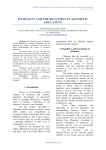
On beauty and the beautiful in aesthetic education
Статья научная
We titled our work “On Beauty and the Beautiful in Aesthetic Education” and we analyzed the category of beautiful in function of better understanding the issues of aesthetic education. The basic point was the fact that the determination of the term beautiful is different in both time aspect and space aspect. Also, the authors involved in this matter have got different understanding on the issue of beautiful, on its essence, on its role in human development and on the development of the aesthetics and the aesthetic education. Therefore, within our work, there is an attempt to differ the approaches towards the category of beautiful, to comment on it, to compare it and finally to give our approach.
Бесплатно
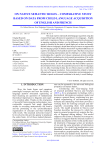
Статья научная
This study explores statistically child language-acquisition using data extracted from large collections for acquisition in two languages - English and French. Comparison of the two collections reveals that the advancement in acquiring vocabulary displays very big differences when the children’s speech is classified by the parts of speech deployed, as these are formally defined in the two languages, despite there being no reasons to suppose that the two language groups of children should show significant differences in cognitive development. The hypothesis put forward is that there exist general classes of meaning-representation and the challenge is to obtain evidence corroborating this. A specific set of classes is proposed, derived according to their different contributing roles in the mental representation of the world, considered from the perspective of an “Actor in the environment” cognitive model. The identified parts of speech from the two languages are sorted into the proposed classes. It is shown statistically that when children’s speech is discriminated to these classes, the acquisition processes in the two languages are very alike. Examining the data, the use of these classes is evident from the onset of language production. Some particularities related to factors influencing the use of communicators, interjections and onomatopoeias in children’s speech are discussed in addition to the study’s overall findings.
Бесплатно
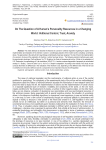
Статья научная
The article attempts to describe the features of a person’s volitional regulation regarding the aspect of the implementation and realization of his intention in action in a challenging situation of the modern world: complexity, uncertainty, stress. The approaches to the study of will in psychology and philosophy have been analyzed. The role of trust in the implementation of a person’s choice and the realization of intention in action has been shown . The following empirical methods were used: the psychometric technique “Self-confidence” by T.P. Skripkina, the Scale of interpersonal trust by J.Rotter in the adaptation of S.G. Dostovalov, the methodology of “Life orientations, SOHO” D. A. Leontiev, express diagnostics of propensity to unmotivated anxiety (V.V. Boyko), “Control in action” by Yu. Kull in S.A. Shapkin’s adaptation. According to the results of our study, we can conclude that there are differences in the realization of the intention to act, depending on the different ratio of the level of trust in oneself and in the world. Self-trust can be a component and an important resource of self-regulation.
Бесплатно
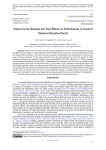
Online course viewings and their effects on performances in COVID-19 distance education period
Статья научная
Despite numerous studies examining student preferences in terms of live and recorded lecture viewings, the effects of lesson viewings on online platforms have been limitedly studied. In this study, the rates of attending live lectures and viewing lecture recordings in the Covid-19 era were examined, and attendance and viewings effects on final scores in these courses were evaluated. For this purpose, data from online education systems of live and record viewings for Turkish Literature, mathematics, and biostatistics classes in the spring semester of 2021-2022, belonging to 13 Turkish universities and 2082 students, were utilized. We found that (1) Thirteen percent of the students did not view any live or recorded courses, and approximately one-third did not enter the final exam; (2) The students in state universities have significantly higher record viewing rates than those in private universities with medium effect size, (3) Females present significantly higher live viewings and record viewing rates than males with small effect sizes; (4) Biostatistics has moderate-high correlations between viewing rates and final scores. On the other hand, there are no or weak relationships between the viewing rates and final scores for Turkish literature and mathematics, in which study materials can be widely accessed from many sources different from biostatistics.
Бесплатно
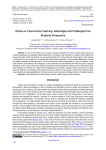
Online vs. Face-to-Face Teaching: Advantages and Challenges from Students’ Perspective
Статья научная
The aim of this research was to examine students’ perceptions of online and face-to-face teaching by combining quantitative and qualitative research approaches. The research was conducted on a sample of 524 students, and the general results confirm that students are more oriented towards face-to-face rather than online classes. Online teaching is recognized as a more flexible form of learning that enables better organization of time, spatial independence, economy and greater availability of teaching content. This form of learning is often accompanied by a lack of motivation, limited social interaction with professors and colleagues, as well as technical and other difficulties that affect the quality of acquired knowledge. On the contrary, face-to-face teaching is perceived as more stimulating for learning, as it provides direct contact, better exchange of information and a higher level of engagement and motivation, although it is less economical and requires more time resources. The obtained results indicate the need to combine the best aspects of both forms of teaching, which include flexibility and digital possibilities of online learning with direct contact and motivational effects of traditional teaching.
Бесплатно
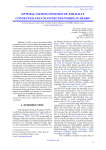
Optimal viewing position of partially connected and unconnected words in Arabic
Статья научная
In order to assess the unique reading processes in Arabic, given its unique orthographic nature of natural inherent variations of inter-letter spacing, the current study examined the extent and influence of connectedness disparity during single word recognition using the optimal viewing position (OVP) paradigm. The initial word viewing position was systematically manipulated by shifting words horizontally relative to an imposed initial viewing position. However, unlike previous research, partially connected/unconnected three-, four- and five-letter Arabic words were displayed in the left and right visual hemifields at all possible locations of letter fixation. It was found that OVP effects occurred during the processing of isolated Arabic words. No OVP was found in three-letter words; for four- and five-letter words, the OVP effect appeared as a U-shaped curve with a minimum towards the second and third letters. Thus, the OVP effects generalize across structurally different alphabetic scripts. Furthermore, a perceptual superiority was found for words with right-positioned unconnected sub-units as compared to left positioned unconnected sub-units because of the differential sensitivity of the hemispheres to the gestalt form of letters. Such findings support the established view that the LH specializes in word recognition for alphabetic languages.
Бесплатно
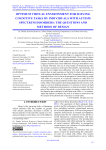
Статья научная
The number of people with autism spectrum disorders (ASDs) is growing in Russia and the world at large. It is important to find ways to diagnose and correct the work with such individuals. There is much evidence that children with ASDs often exhibit pronounced communicative difficulties, problems in establishing visual contact etc. Specialists working with this category of patients face serious difficulties in trying to find effective ways to interact with them. The use of virtual reality environments that have the necessary parameters, determined theoretically, experimentally, and practically, can mitigate these difficulties. The study has shown that, at present, there is much experience in the field of virtual reality application while working with children who have ASDs. Nevertheless, there are several unspecified issues. First, as far as the perception of virtual reality by people with ASDs are concerned, it is especially important to study them. Of much importance are the peculiarities of their states associated with virtual reality, while solving cognitive tasks during diagnostic and corrective work stage, as well as in obtaining education. It is necessary to choose the right methods of visualization and interaction in a virtual environment. The focal point of the article is to justify the project of creating a virtual reality for the diagnosis and socialization of individuals with ASDs, i.e., its structure, stages and methods. In addition, the work is of interest in connection with the research of the phenomenon of presence in virtual reality.
Бесплатно
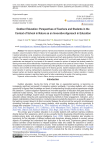
Статья научная
This research analyzed the opinions of primary school teachers and students regarding the benefits of outdoor education, using the example of School in Nature, for the organization of educational activities within the instruction process. It explored educational, social, recreational, and ecological aspects, as well as the existing differences in their opinions. The research was conducted on a sample of elementary school teachers and fourth-grade students in the Bor District in the Republic of Serbia. The research involved 223 participants (elementary school teachers N=73, and fourth-grade students N=150). A questionnaire was designed for the purposes of this research to assess the opinions of teachers and students towards the learning environment and the effectiveness of implementing outdoor education in the context of School in Nature. The research results indicate a compliance between teachers’ opinions about the significance of outdoor education, especially through School in Nature, and its benefits to the educational aspect of the teaching process. Students displayed positive attitudes related to social interaction in learning, emphasizing the development of positive social relationships and skills. Differences in opinions between teachers and students regarding the learning environment and the effectiveness of outdoor education in meeting learning objectives represent a significant starting point for better understanding the quality of the teaching process.
Бесплатно
Parametrical words in the sentiment lexicon
Статья научная
In this paper, the main features of parametrical words within a sentiment lexicon are determined. The data for the research are client reviews in the Russian language taken from the bank client rating; the domain under study is bank service quality. The sentiment lexicon structure is presented; it includes two primary classes (positive and negative words) and three secondary classes (increments, polarity modifiers, and polarity anti-modifiers). This lexicon is used as the main tool for the sentiment analysis carried out by two methods: the Naïve Bayes classifier and the REGEX algorithm. Parametrical words are referred to as the words denoting the value of some domain-specific parameter, e.g. the client’s time consuming. To distinguish the main features of parametrical words, the parameters relevant for the bank service quality domain are determined. The revised lexicon structure is proposed, with a new class (decrements) added. The results of the research demonstrate that parametrical words express implicit opinions, since parameters are not usually named directly in reviews. Only a small number of parametrical words can be ranged into the primary classes (positive or negative), but this ranging is domain-specific. It is the parameter that determines the domain specificity of such words. Most parametrical words are ranged into the secondary classes, and this ranging can be considered universal. The parametrical words denoting the increase of a parameter should be ranged into the increment class, as they intensify positive or negative emotions. The parametrical words denoting the decrease of a parameter should be ranged into the decrement class, as they reduce positive or negative emotions. The evident progress on the way to the sentiment lexicon universalization can be achieved by classifying parametrical words within the sentiment lexicon.
Бесплатно
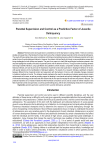
Parental Supervision and Control as a Predictive Factor of Juvenile Delinquency
Статья научная
Parental control and supervision is considered one of the key factors in raising children. There are numerous studies and researches in the literature that have tried to prove the correlation between parental control and juvenile delinquency. The results of these studies have varied, sometimes confirming and sometimes denying a direct link between parental control and certain forms of juvenile delinquent behavior. However, the modern child and family go through a new socialization process that brings challenges for both children and parents. The goal of our paper is to clarify the terminological confusions present in this area and highlight the actuality of the issue of parental control over the behavior of minors. Through a review of existing domestic and foreign scientific literature, using quantitative and qualitative content analysis, comparative analysis and comparative and historical methods, we want to point out the importance of parental control and supervision in shaping the behavior of minors, with special reference to the manifestation of delinquent patterns. The results of our research indicate a significant correlation between different forms of parental control and supervision with the behavior of minors, with noticeable changes compared to traditional methods of control. The obtained results emphasize the need for educating and advising parents about modern achievements in this area, as well as providing support in adapting to new trends and security challenges, including the impact of information technology, social media and other factors that are now part of everyday life and were not present in the past. The practical importance of our research implies that the theoretical conclusions can be used as a basis for further research in the field of parental control and supervision, as well as juvenile delinquency, with the aim of developing measures for its prevention.
Бесплатно
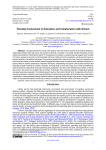
Parental involvement in education and collaboration with school
Статья научная
This paper presents the results of the research which was aimed to examine the connection between the collaboration between family and school, and parental involvement in education. The sample included 198 parents of senior primary school students in South-Eastern Serbia. For the purposes of the research, a Questionnaire was designed which consisted of 30 items, grouped into two parts: the first part deals with forms of family and school cooperation, and the second focuses on parents’ perception of educational techniques. Chi-square test shows that the most common form of parental cooperation with school is parent meeting, and that mothers are more engaged than fathers when it comes to parent meetings and lectures for parents. Based on parents’ assessments of education techniques, understanding and support is the education technique that dominates parental involvement in children’s education, while high level of control had a lower score. There were differences observed in parents’ assessments of education techniques analysed by t-test, where more withdrawal from children, as well as less control in are shown more by fathers than by mothers. Examination of the predictive properties of independent variables was tested using linear regression. The obtained research results on the impact of certain forms of cooperation with school on parental involvement in education have shown that lectures for parents and conversations at the initiative of the class teacher are predictors in creating desirable patterns of parental behaviour by granting children the right to their opinion. Gaining empirical insight into the mentioned relations benefits future research and practice of education efforts of the family and school.
Бесплатно
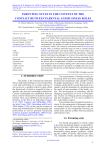
Parenting style in the context of the conflict between parental and business roles
Статья научная
The paper discusses the connection between parenting style and the scope of the conflict between parental and business roles. For a parenting style, we used the concept of Dianne Baumrind (1966/2002), who defined three basic types of a parent-child relationship: authoritarian, authoritative and permissive. The problem of conflict is accessed through the theory of work-family conflict, the Greenhaus and Beutell model (Greenhaus and Beutell, 1985), according to which the impact of work on a family consists of three sub-dimensions: time-based conflict, strain-based conflict, and behaviour-based conflict. The survey involved 204 respondents - employed parents with at least one child aged 3 to 16 years. The results of the research have shown that the authoritarian and the permissive parenting style is accompanied by a more obvious conflict of parental and business roles, while the positive effect of employment is linked to the authoritative parenting style. Implications of the obtained findings show that business and family responsibilities enable parents to participate in multiple roles, that can be used to promote their growth and development and better functioning in the parental role.
Бесплатно
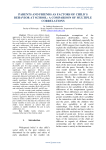
Parents and friends as factors of child`s behavior at school: a comparison of multiple correlation
Статья научная
Why are some children lonely, aggressive or they behaving prosocially at school? This study tends to answer the research question: how are family and peer relations associated with the social behavior of the pupils in mid childhood and early adolescence (3rd grade and 7th grade pupils), respectively. The hypotheses refer to the differences in the connections of the family and peer relations with the student’s social behavior at school. The data gathered from 194 examinees were elaborated in the research, as follows: 3rd grade pupils (85) and 7th grade pupils (109). The data from third grade pupils shows that multiple correlation between family variables in regards to loneliness is more significant (R=0.639, p0. 05) which is not significant. For aggressive behavior both correlations: family (R=0.494, p
Бесплатно
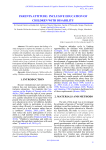
Parents attitude: inclusive education of children with disability
Отчет
This article reports the findings of a study designed to explore the attitudes of parents of “normal” developing children toward the inclusion of children with disabilities into mainstream education in Macedonia. Specifically, the study was designed to explore the similarities and differences in the attitudes of two groups of parents: a group of parents of preschool children and a group of parents of school age children. Participants included 88 parents. Generally, many of the parents accept inclusive education, but most of them still think the special school is better place for education of children with disability.
Бесплатно
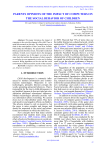
Parents opinions of the impact of computers on the social behavior of children
Отчет
This paper introduces the impact of computers in the social development of the child. There is quite little research on this topic. The sample survey was made in the municipalities of the Crveni Krst, Palilula, Niska Banja and Medijana. The questionnaire contains fifteen questions that have closed. A descriptive-analytical methods. Overall, most research shows the damaging effects of computer use. In this paper, we come up with some facts that confirm the opinions of other researchers and also give an opportunity to also use for further research. Being dependent on the site and the social environment is different and the results of the research.
Бесплатно
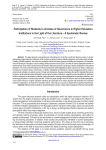
Статья научная
This paper presents a comprehensive methodology for conducting a systematic literature review on student participation in higher education institutions (HEIs), focusing on decision-making, student engagement, and extracurricular activities. Following PRISMA guidelines, the review uses evaluation criteria techniques to ensure the quality and transparency of information critical to the design of the paper. A search strategy utilising key terms across EBSCO and Web of Science databases identified 41 relevant articles. Each article underwent thorough analysis, addressing research inquiries about student participation in educational institutions. The review combines findings from diverse perspectives while highlighting students’ importance in decision-making and the relevance of student voices in this process. In addition, it highlights the importance of student engagement and the impact of extracurricular activities on academic success. Through such discussions, the paper emphasises the need for integrated frameworks focused on understanding student participation across higher education institutions, suggesting recommendations for optimising student involvement or participation in decision-making processes, fostering student engagement in teaching and learning, and enhancing participation in extracurricular activities. Overall, the paper highlights the multi-dynamic nature of student participation in the modern structure of higher education institutions and advocates for a holistic approach that empowers and motivates students to participate in all areas of the education system, which will go a long way in shaping their educational experiences.
Бесплатно

